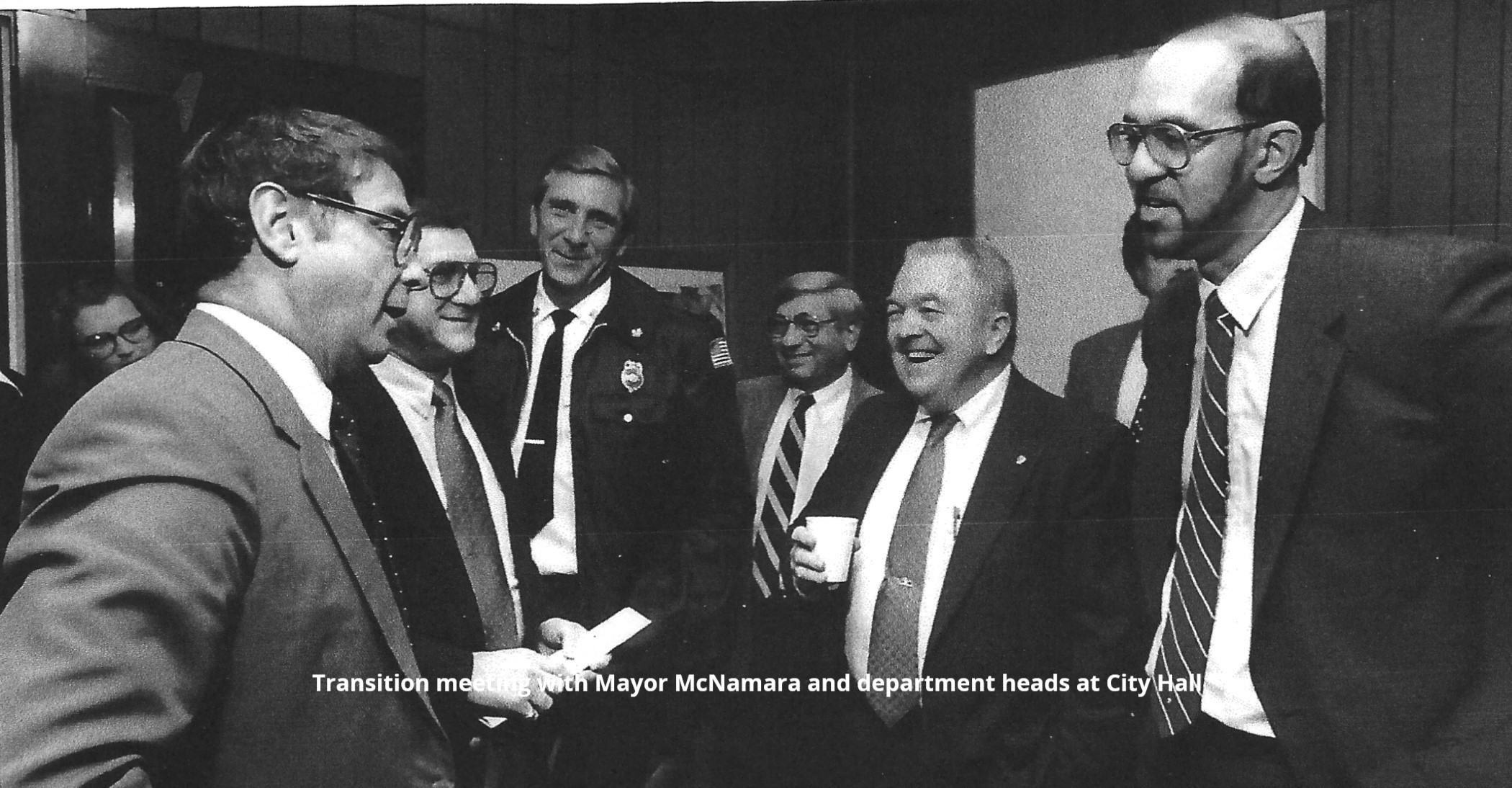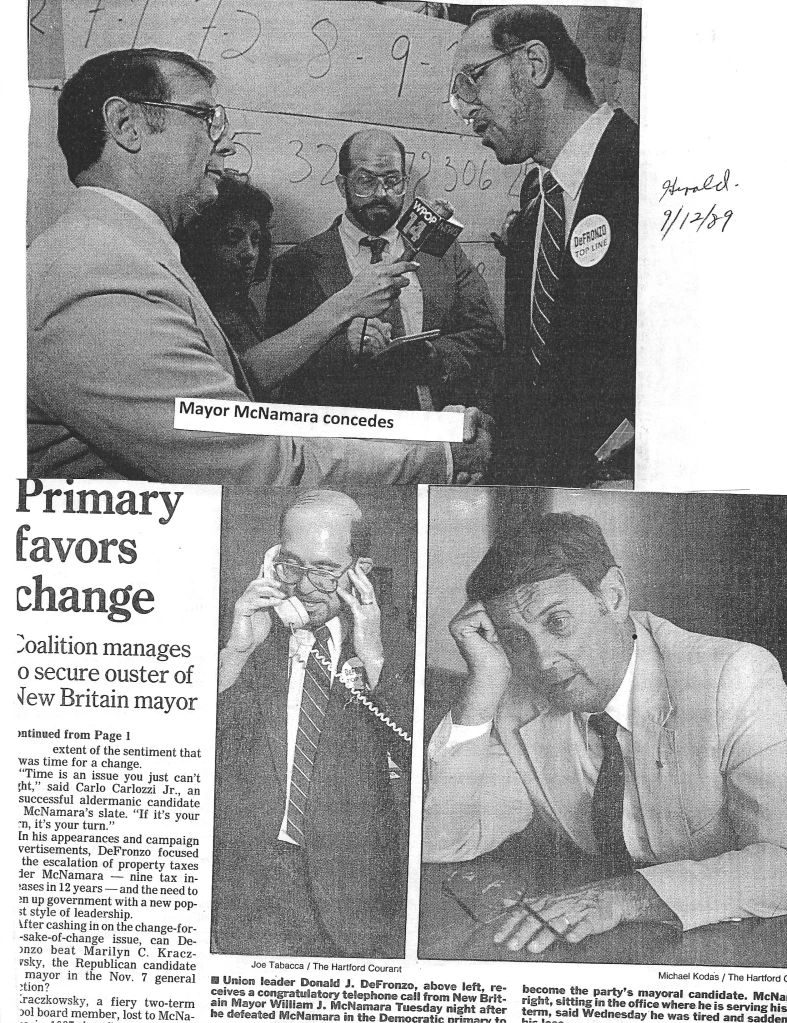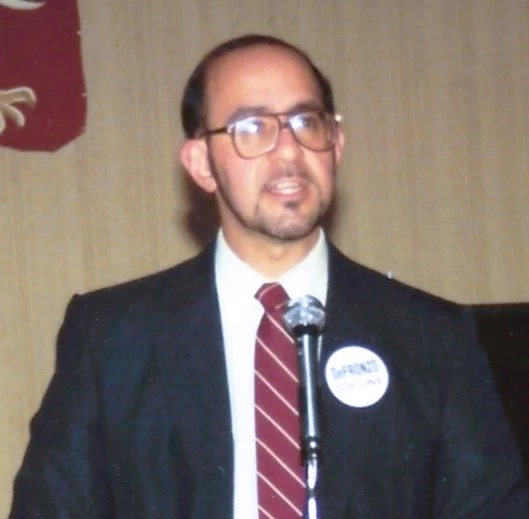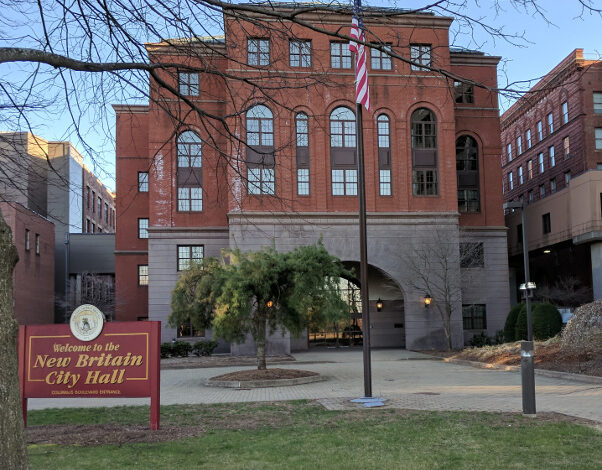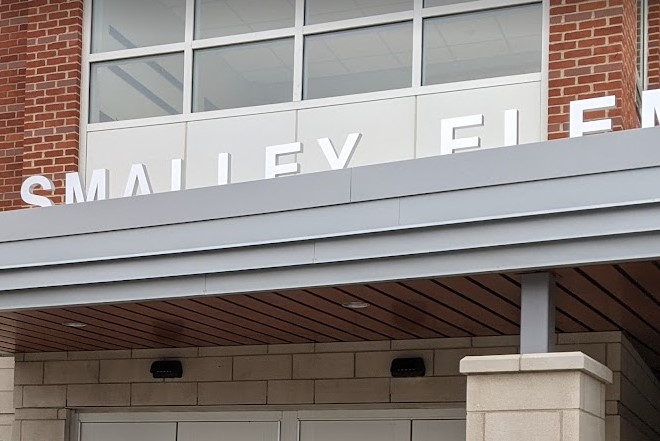The Municipal Campaign That Changed New Britain Politics For A Generation
Introduction to Part 3
In 1989, Donald DeFronzo became New Britain’s 34th Mayor ending the late William (Billy Mac) McNamara’s six terms as the city’s top elected official, a modern-day record not matched until last November when Mayor Erin Stewart won a sixth, two-year term.
“During the depths of the Covid pandemic in the spring and early summer of 2021 I began to write this (campaign) retrospective after watching a CNN documentary on the Vietnam War,” states DeFronzo. “One segment of that series dealt with the opposition to the war and the number of individuals who had achieved conscientious objector (CO) status and how that status impacted their lives. It caused me to question how many of these roughly 500,000 individuals had gone into a career in elective politics and government. Although my search was limited, I could not find one prominent politician who had been a conscientious objector. ”
In Part 3 of this 3-part series DeFronzo reflects on the factors that contributed to his Primary victory over a six-term incumbent and overcoming harsh attacks over his CO status. According to DeFronzo the bitterness of the primary campaign gave way to McNamara endorsing DeFronzo for the general election against his other formidable opponent, Republican Marilyn Kraczkowsky.
At the end of this day by day account of the 1989 campaign DeFronzo concluded:
“….throughout my several careers in public service, union work, non- profit management and elected office, the only time my CO status was raised as a serious impediment to service was as a candidate for mayor of New Britain. In 2011 when Governor Malloy was considering me for an appointment to his cabinet, I advised him of my CO history, expecting that it might be raised in the confirmation hearings and could become an embarrassment to him. He did not hesitate in responding – “Don, that just adds to my confidence in making this appointment.”
Watershed: New Britain’s 1989 Mayoral Campaign Part 1 January 21, 2024
Watershed: New Britain’s 1989 Mayoral Campaign Part 2 January 29, 2024
Watershed: 1989’s Mayoral Election, excerpted here, is DeFronzo’s personal account of the 1989 municipal campaign based on his observations, the recollection of friends and news coverage at the time. A copy of Watershed is on file in the history room of the New Britain Public Library.
Thanks to Don DeFronzo for permission to publish an abridged version in this series. –John McNamara. NB Politicus.com
Part 3
Personal Thoughts After The Primary
What accounted for our overwhelming primary victory? Looking back over the campaign, we did some things well and McNamara did several things poorly. As difficult as it was to design and execute, the time and effort invested in the February poll was well worth it. The results allowed us to design an issues road map on which we would run our campaign.
We accurately identified McNamara’s weaknesses – arrogance, inaccessibility, longevity and his hostility to neighborhood groups. It also importantly showed us that the Conscientious Objector (CO) issue was not fatal and, if handled appropriately, could be managed. We did that.
By responding to McNamara’s hysterical, poorly planned veteran-based political attacks in a calm and rational way, I was able to neutralize the issue. We never tried to convince voters that I was right about Vietnam, but only that my position at that time was not a factor in the mayoral race.
Another great strength of our campaign was the Coalition, an alliance of formerly feuding political factions. Led by State Senator Joe Harper and State Representative Stan Krawiec, the factions united and the slate that emerged was well balanced and in the shared cause of removing Billy Mac from office. Personally, I was heartened by the fact that throughout the entire CO controversy not one Coalition member jumped ship.
There were doubters but our ability to raise money and to be competitive with an incumbent six-term mayor happened. The standing campaign finance committee, headed by our treasurer, Barbara Yezierski, did an outstanding job. Barbara would go on to serve in my administration as the first female chairperson of the City Finance Board and subsequently elected an alderwoman.
The organizational integrity and effectiveness of the campaign was remarkable. Its discipline, punctuated by daily calls from Leavenworth, Harper and Clebowicz, maintained focus and momentum. Volunteers were plentiful, motivated, focused and persistent. The campaign started in February, more than six months ahead of the primary date, yet the volunteer base remained loyal and continued to grow.
Issue development for us was well researched, focused on identified matters of concern, and resulted in a series of well-stated, and well-received white papers. Still, as our poll had demonstrated, the most meaningful issues pertained to Mac’s low favorability ratings, length of service and the desire for change. Finally, we could never underestimate the value of daily door-to-door canvassing. Visits to the homes of over 5,000 New Britain residents prior to primary day vastly improved my name recognition and gave voters the opportunity to meet me and form an unfiltered impression of the challenger. With few exceptions, voters were receptive and the results were ultimately impressive.
Personally, I had learned a valuable lesson about New Britain voters. Sure, there were immovable and polarized segments of the community, but the large majority of hard working, tax-paying residents, only wanting fair treatment from their city government, were open minded and fair on the CO issue. They did not pre-judge. They were willing to listen to, and then understand, the morality and complexity of the Vietnam issue. For the most part, they did not want to perpetuate or re-live the divisions of the 1960s. From that campaign on, I have always had an especially deep respect for the voters of New Britain.
From our perspective the McNamara camp apparently thought that exploitation of the CO issue was the cure all for their imperfections. To this day, I do not believe McNamara, or his team, ever knew just how unpopular he had become, or how strong the change sentiment was. Presented with a credible and unified opposition, I always thought the mayor would be in trouble.
Clearly, from day one Mac’s strategy was to deliver an early knockout blow on the CO issue, mounting for me, a six-week public assessment of my character and patriotism through a series of “trials” conducted by New Britain’s 15 veteran organizations. Their inability to unify even the veterans community on that issue, was a huge embarrassment, and an early indication of Mac’s fading influence. Entrusting that effort to such incompetents as Parparian, Hermanowski and Manafort was a failure of leadership on McNamara’s part. He got what he deserved.
Once burned, however, they kept going back to the well. Again, in the “Wall ad” fiasco, incompetence, poor planning and arrogance led to public embarrassment and internal discord for Mac’s campaign. McNamara’s unhinged reaction to being caught in a copyright infringement was humiliating and a sign his campaign was falling apart. McNamara was actually making me look his equal, or better, by allowing me to out duel him on these political attacks and how they were being handled by each candidate. Of course, as indicated earlier, much of the credit for this goes to Walter Clebowicz and Wendy Watriss. The United Veterans gambit fared no better.
Bill McCue, Mac’s campaign manager, would, after the primary, reveal a major miscalculation on their part. He said the McNamara campaign had projected a voter turnout in the range of 40 to 43% , or 8,500 voters. They had planned to pull out 4,500 McNamara voters, enough to give him a 500-vote primary victory. In fact, our campaign generated a 53%, 11,203 voter turnout. The McNamara vote was right on target, 4.437, but, due to the effectiveness of our campaign volunteers in getting out the vote, it was 2,000 votes too little.
This was not an accident. I had fashioned my campaign along the lines of a political theory, presented by William Schattschneider, in his book, the “Semisovereign People” written in 1960. Schattschneider observed that 40% of voting age people do not vote and, to the extent that a candidate can raise an issue of personal concern, or attract non–voters to the political contest, his or her campaign will succeed or fail. He believed that if a previously uninterested voter realized he now had some tangible interest in the outcome of a campaign, you could motivate that person to vote.
Door to door canvassing had many benefits, but one was learning about the dozens of localized, micro issues, voters were concerned about. Speeding cars in one neighborhood, potholes in another, tree trimming in another, noise in another, sidewalks in another, neglected property in another, and gangs in another and so on. In each neighborhood I would integrate the local complaints into my message at the door and increase the voter’s interest in my campaign. Similarly, in follow up mailings and in debates, I would make reference to some of these issues and urge voters to become part of our effort to change the direction of the city.
In addition, I did not limit my door knocking to regular voters. If the person was listed as a Democrat I stopped at their home, even if the resident hadn’t voted in years. In this way we expanded the primary universe and increased the turnout by drawing new voters into the contest. An elderly man on Rhodes Street told me he hadn’t voted since Roosevelt’s last election in 1944. On Primary Day I was elated to see that he had gone out and voted in person. That’s how we got to a 53% turnout in a primary, a New Britain record that stands today.
Finally, the arrogance, for which McNamara was well known, undeniably played a role in his demise. He never altered his policies, or approach to city issues throughout the entire six-month campaign. Perhaps a little humility, and a change in direction would have affected the outcome.
In retrospect, had McNamara held the CO issue until the end of the campaign, instead of making it an early focal point, things may have been different. I think that is likely because it took time and effort to explain the issue and move voters from the “unsure” category to the “it doesn’t make a difference” category. Their strategy, in effect, gave us the time to make our strategy work.
On to November
Marilyn Kraczkowsky was a long-term city resident and an elected member of the Board of Education (BOE). Diane had actually served with her between 1983 and 1987 and found her to be highly opinionated and good to work with if you agreed with her. If not, sparks could fly. She was a constant critic of both the school administration, Superintendent Marie Gustin and Mayor McNamara. Formally a Democrat, she ran for mayor as an Independent in 1987, outpolling the Republican and losing to Mac by nine hundred votes. Following that, she changed her affiliation to Republican, obviously trying to set up a re-match with McNamara in 1989.
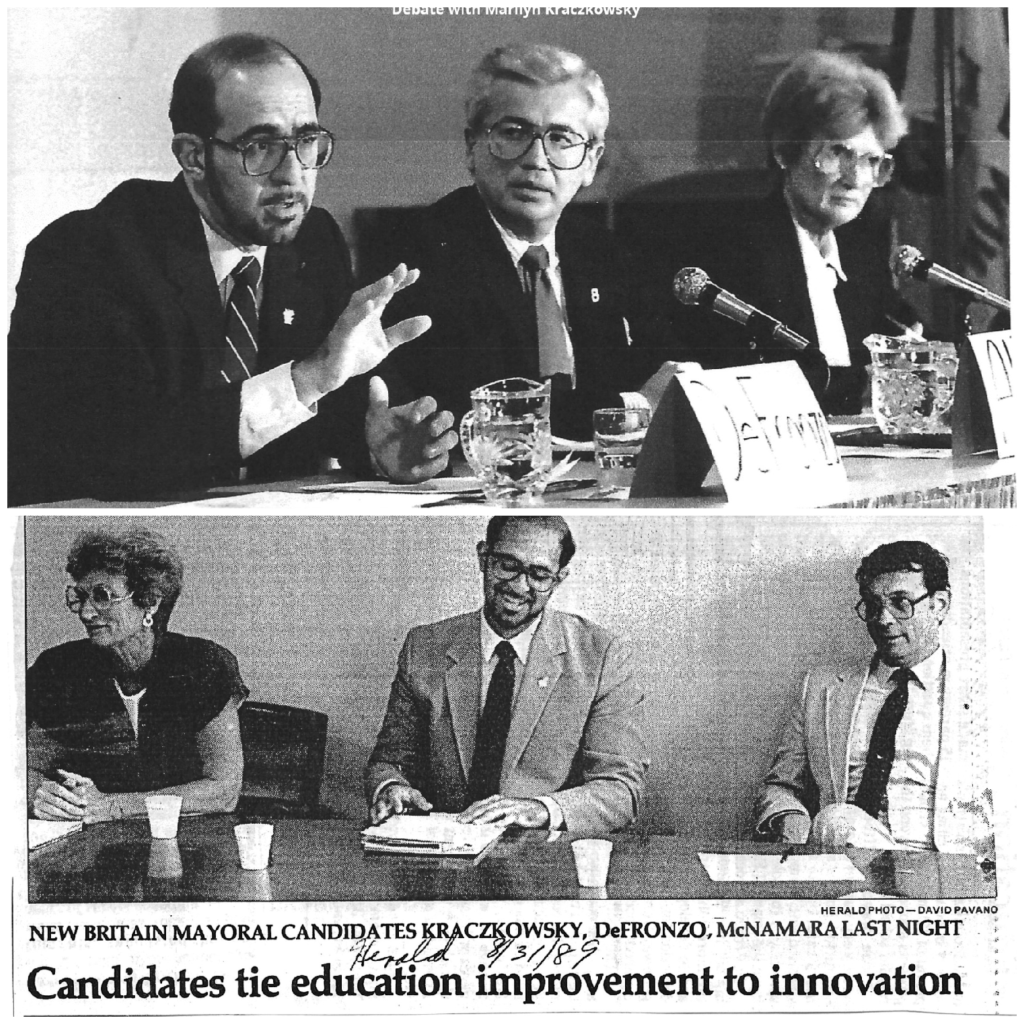
She was a knowledgeable, well-educated articulate woman. She was known for her acerbic personality and sharp tongue. She had a following. Because she had run as an Independent in 1987, she would control the Independent Party line and, as a result, would appear on the ballot twice – once as the Republican, and again, as the Independent.
Many on our side were concerned about that , but I never really was. You could only vote for her once no matter who many times her name was listed on the machine. Beyond that, the number of voters listed as members of the New Britain Independent Party was only a few dozen. This was still a face-off between Democrat Don DeFronzo and Republican Marilyn Kraczkowsky.
On September 18, just a week after the Democratic Primary, Kraczkowsky spoke to the New Britain Rotary Club. At the outset she quipped, “Well, we don’t have Billy Mac to kick around anymore,” but she did take a few shots at me.
She said that I lacked a sufficient level of community experience, and that her work for the United Way and her recognition by the Citizens Property Owners Association (CPOA) and her deep roots in New Britain made her the better qualified candidate for mayor. She also echoed an old McNamara claim that I was controlled by the political bosses (Harper and Krawiec) and that I couldn’t be an independent leader. To that she added that I lacked administrative experience. On that day she did not resurrect the CO issue, however, she went ideological saying “I (Kraczkowsky) am a very traditional person, I don’t believe liberal DeFronzo conforms to an orthodoxy.” She wanted to make “ideology” an issue in the fall campaign.
Meanwhile, Marie Gustin, a Rotary member and a frequent target of Kraczkowsky’s criticism, walked out of the luncheon before Marylin began speaking.
We believed it was quite probable that Kraczkowsky would, at some point, raise the CO issue. Paul Manafort, former Republican mayor and McNamara ally, was advising her campaign. It was only a matter of time.
On the Democratic side, the fallout of Mac’s defeat became evident as high-profile administrative appointees began vacating their positions, among them James Carey, City Improvement Committee chairman, former mayor and architect of the “Wall ad.” He said it was not political, but let’s be real.
Despite the deep acrimony of the primary, Mayor McNamara graciously agreed to meet and discuss the impending campaign. In public he said he didn’t think I would want his advice, and didn’t know if a meeting would be productive, but privately he had an agenda. We agreed to meet in a rented room at the local Holiday Inn Hotel to insure privacy. Maybe a bit dramatic, but it was fine with me. Democratic Town Chairman John King, a long-time Mac ally, was instrumental in arranging the meeting. John, a prominent Hartford lobbyist, also had an agenda. His law firm held the lucrative contract as Bond Counsel for the city. With a new mayor that contract and his position as Democratic Town Chairman were in serious jeopardy. After some preliminary discussions between Harper and King, Mac and I were scheduled to meet on Saturday afternoon, September 23.
On September 19, responding to Kraczkowky’s attacks at the Rotary, I went on the offensive, challenging her to a set of debates and saying her attacks on me for being a big spending liberal were totally unfounded. If she wanted to see big spenders, I said, she need look no further than the Republican members of the City Council who voted, to a person, to support Mac’s $23 million City Hall Renovation project. On the issue of administrative experience, I said “… she had never supervised a professional staff or managed a budget, I have. For all her talk, the truth is she has virtually no practical experience whatsoever.” Going further, I said “She shoots from the hip, but lacks the leadership ability to work cooperatively. She lacks effectiveness.” Finally, with respect to the question of ideology, I was not gentle. I stated that my primary political philosophy was a “constant concern for people issues.” I charged that she had no set ideology or political compass. Having hopped around from the Democratic Party, to the independent line and now to the Republican Party, voters would have no idea of what to expect from this lack of “political stability.” This blast was the strongest barrage I had made throughout the campaign. My criticisms of McNamara had been sharp but spaced out over a period of time to maximize press coverage and my exposure to the voters. I didn’t need to be concerned about that now. More important was demonstrating to Mrs. Kraczkowsky she wasn’t going to get a free ride. Criticism would be met with criticism.
Immediately following the primary, our campaign had scheduled a big-ticket fundraiser to replenish our campaign treasury. With Mac out of the way, we were hoping that a lot more doors would be open to our funding requests. In September we raised just about $16,000, far exceeding our early campaign goal of a thousand dollars a week.
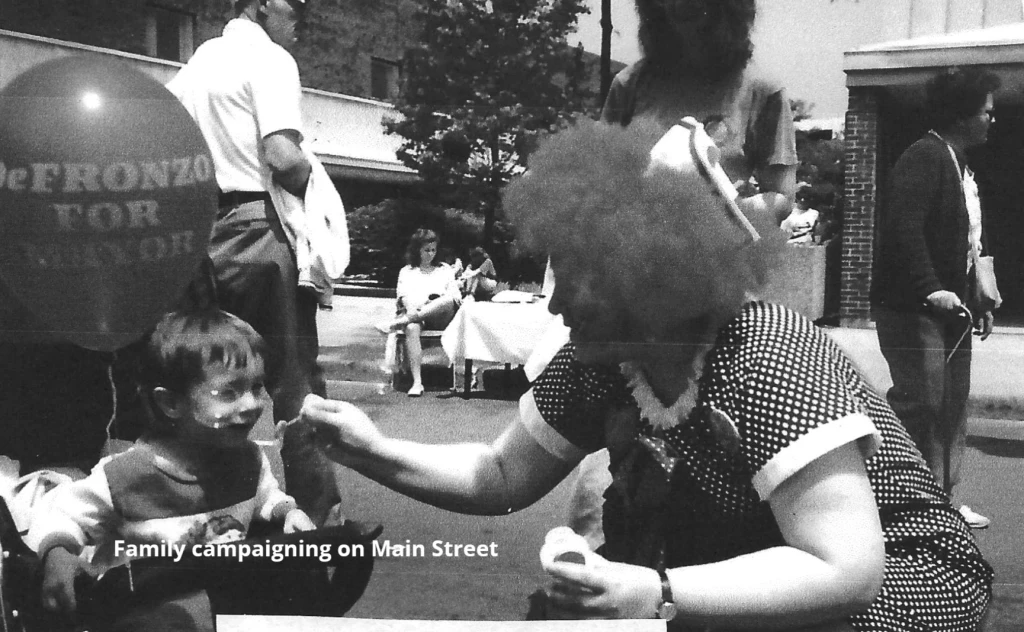
We did not have long to wait for the CO shoe to drop. Obviously, angered by our September 19 frontal attack, Kraczkowsky decided to use her September 20th campaign opening as the stage from which to launch her attack.
“The biggest difference between my opponent and me is courage. My opponent, who walked away when his country called, showed his true colors when he waged a vicious and cowardly campaign against me in the newspaper.”
My comments from the previous day got under her skin and if she thought, as some had speculated, that I might take a more oblique approach to her because of her gender, she was wrong.
Paul Manafort spoke at her opening adding that:
“We tried to stop him in the primary. We could not. We are going to stop him in the coming election.”
When asked by the press, Peter Bezrucik, Kraczkowsky’s campaign manager, said Kraczkowsky would not use the CO issue again. We did not believe him. The next morning (9/21) the lead editorial in the Hartford Courant’s regional news section read:
“Mrs. Kraczkowsky discredits herself.”
The editors assailed her for rehashing the CO issue and said she ran the risk of “turning off voters if she mimics Mayor McNamara.” They called on her to stick to the issues. We had hoped that the quick and sharply worded editorial rebuke would moderate her tactics.
We never took Kraczkowsky for granted, but most of us really did believe we would prevail. After the primary, the fall campaign took on an almost anti-climactic feel, but we needed to be careful. Diane had worked with Marilyn on the BOE and knew how gritty and tenacious she could be. More than anyone, Diane would not let us relent in our campaign efforts. For my part, from August to November, I had logged another 2,500 canvassing stops, bringing my total for the campaign to well over 8,000 doors.
On Saturday, September 23 Mac and I met. In the time since we scheduled the meeting my campaign had scheduled a Democratic Unity Rally for the following Wednesday, September 27. We had reached out to many of McNamara’s candidates, his appointed commissioners and political advisors. Many had responded positively and planned to attend the rally. With, or without Mac, we were going forward and would invite his supporters to join our campaign.
At the meeting it was just Billy Mac and me. We were cordial, discussed the primary briefly and then got down to business. Very little of this was revealed at the time, but it was, in fact, the basis upon which McNamara cautiously made the decision to endorse me.
My agenda included the following:
- Secure McNamara’s endorsement at best, or his neutrality, at the least.
- Provide him with an opportunity to protect a few of his commissioners or members of his staff.
- Talk about the transition.
- Win a delay in final action on the City Hall renovation and Gates Building contracts which were pending before the City Council.
My assessment of Mac’s objectives was purely speculation but soon became clear. He did have an interest in protecting some of his commissioners and political allies; he also wanted to inform me of how he planned to handle his last several months in office, including a pledge that he would ensure a smooth transition, no matter who won, and finally, how he would handle the endorsement , if any.
We both agreed that the contents of the meeting would be kept secret and, at the end of the meeting, we would agree on a brief statement to be given to John King for release. If directly asked about the meeting, we would stick to the general statement.
In deference to his position, I told him I wanted his endorsement and would be willing to discuss anything on his agenda as part of that conversation. He was straightforward and said he would like to endorse me. After all he said, he was a Democrat and wanted to support the Democrats. He would not, however, endorse my CO status or objections to the Vietnam War. I understood his position believing, that as much as I felt I was right on Vietnam, he felt he was. If asked about Vietnam, he would express his opinion. My immediate reaction was that that was a fair proposition. As we had said a number of times, it was never our intent to convert people to my point of view on Vietnam, but only to convince people it was not particularly relevant. I had no problem with his proposal, but I did suggest that, if he was to make an endorsement, it might be cleaner if he addressed that issue in his endorsement statement, and not let it linger for follow up questions. We knew it would come up, so why not address it head on. He said he would think about it.
Unrelated to the issue of an endorsement, Mac did ask me to consider retaining several of his commissioners, particularly a couple of commission chair people. He did not ask for anything outrageous, the names he mentioned were well respected and, by all indications, had done well in their positions. Still, I told him I would seriously consider retaining all the names he gave me on their respective commissions, but that I would want to appoint my own chairs, for obvious reasons. He thought that was fair. He also told me he had one or two staff members in his office who were hoping they could be retained. He said he knew that was unrealistic but, since he promised them, he would raise it. He asked if I would, at least, agree to talk to them about their interest. I told him I would be happy to have a discussion, and explain the situation, but that I really needed people I could trust in the mayor’s office.
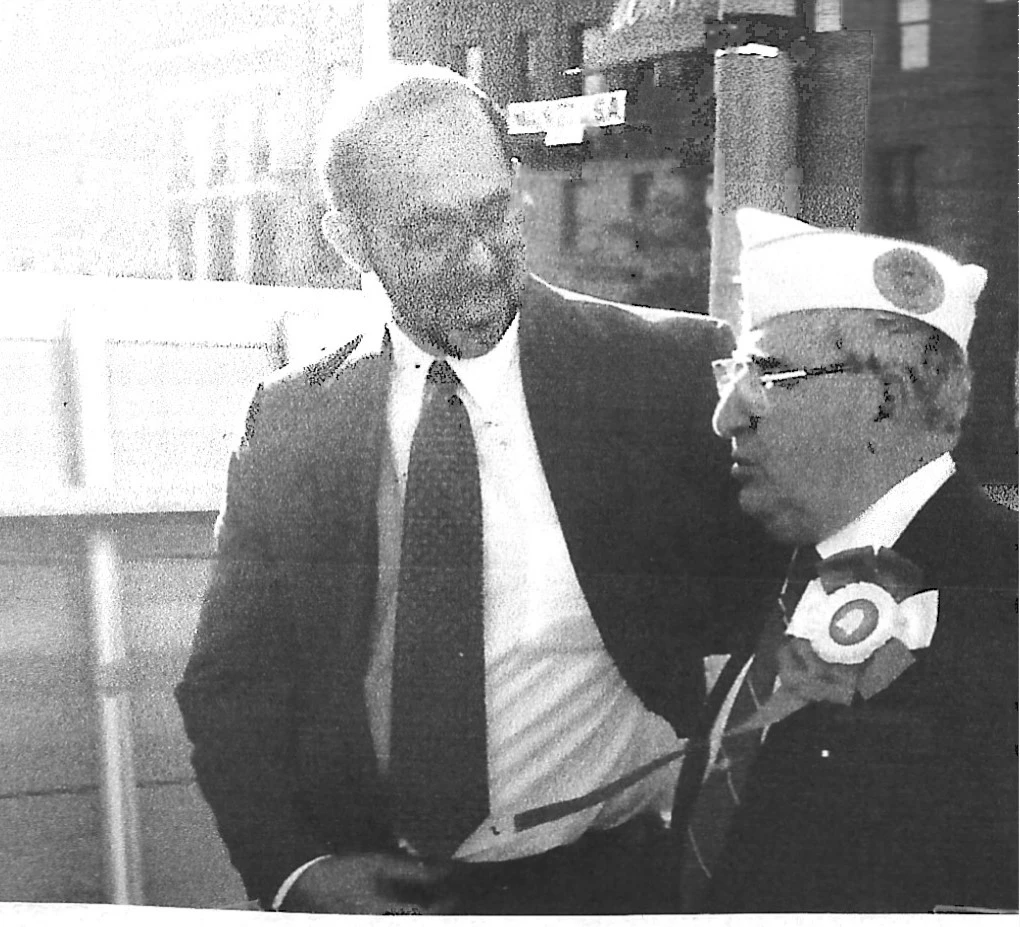
We next discussed the role of John King, New Britain Party Chair. In truth John had been good for the Town Committee, but his decision to support Mac in the primary, after 70% of his membership supported me, put his future in grave jeopardy. John had multiple ties to New Britain. His law firm held the city’s lucrative Bond Counsel contract; he was Town Chairman and, as an attorney with close ties to the mayor, he often represented developers seeking to do business with the city. After a bit of discussion, I told the mayor that salvaging his position as chairman was impossible, but I would be open to retaining his firm as Bond Counsel for another year, while we conducted a search for a new representative. He was satisfied with that and thought it might be a better solution for John. I agreed to discuss the options with John after the election.
We moved onto the City Hall and Gates Building contracts. Not much give here. He felt the city and companies involved had negotiated in good faith. He was comfortable with the outcomes and planned to move forward with approval as early as the following week. This had been one of his initiatives and he was committed to locking in the project before he left, knowing that once the contracts were signed, the cost and legal entanglements of undoing them would be staggering. He listened to my pitch that the new administration should be able to weigh in on the deal, but he wasn’t budging.
I wanted him to know that I would be compelled to ask the Council to table the contract and defer it to the new administration. Knowing he had the votes on Council to approve the contracts, he said “feel free.” We understood each other and moved on.
With that done, I invited him to the Unity Rally hoping he would make his endorsement there in front of several hundred Democrats representing a cross section of the party. He said he would attend and speak there if I wanted. I expressed my appreciation and told him we would plan on him making remarks. We agreed that John King would be told that our meeting had been “cordial, positive and productive.” John and McNamara would determine how they wanted to announce Mac’s decision to attend the Unity Rally, and what he might say, with John handling any follow up questions. My comments would be limited only to the “positive and productive” nature of the meeting. I would not comment on Mac’s decision to endorse – he wanted to handle it his way and that was fine with me.
Reports of the meeting scored a front-page Herald story on Monday, September 25. The headline read: “DeFronzo, McNamara meet; session described as “productive, positive.”
King had informed the press that McNamara would be attending the rally and he would be making remarks at that time. It appeared we had succeeded in getting Mac to make a public endorsement precisely at the right time. We felt relieved.
On the morning of September 27th the dispute over access to the Independent Party line on the November ballot was resolved. After Marilyn Kraczkowsky narrowly lost a Democratic primary fight to McNamara in 1987, she and Jim Leavenworth formed an Independent Party and qualified for the general election ballot that year. While out polling the Republican, Kraczkowsky lost the general election by about 900 votes. However, she immediately began planning for a one-on-one rematch with McNamara in 1989. To assure that, she changed parties, became a Republican and would secure the Republican nomination for mayor while assuming she would still control the Independent Party line she and Leavenworth had established in 1987. This would allow for her name to appear on the ballot twice. Of course, this plan was predicated on the assumption that McNamara would again be the 1989 Democratic Party nominee.
Jim Leavenworth, now heavily involved in the DeFronzo campaign, operating on his own, and not as a campaign official, asserted his right as an Independent Party co-founder. He encouraged a local political personality, Joe Pac, to contest the independent line, which he did. When City Clerk Richard Murphy would not grant Kraczkowsky’s claim to the line because of the dispute, she challenged the decision in court arguing that Pac had no right to the Independent Party nomination. Jim saw in this dispute an opportunity to tie up the Kraczkowsky campaign in court for several weeks. Clebowicz advised Jim, and Pac got his personal attorney, Fred O’Dell, to represent him. The case centered around the rules of the Independent Party as written in 1987. In the end Judge Joseph Goldberg decided in Kraczkowsky’s favor awarding her control of the Independent Party and the position on the ballot.
For most people this was all inside baseball, but Kraczkowsky thought it was important and invested significant time and resources in winning the case. I always thought she over valued the benefit of being placed on two lines, but she made her own decisions and Leavenworth and Clebowicz were delighted that she had diverted two full weeks of limited campaign time to a court case of dubious value, while I was out campaigning full time.
On the evening of Wednesday, September 27th over 300 Democrats crammed into the Pulaski Democratic Club to see what many thought would never happen, Bill McNamara endorsing Don DeFronzo for mayor of New Britain. John King had informed me that the mayor would note his reservations on the CO matter in the context of his comments as I had suggested.
Among the 300 attendees were dozens of Mac supporters, volunteers and commissioners. He brought his “band” with him, and I was grateful. Admittedly, his endorsement was not a “Don DeFronzo 1,000%” type endorsement, but it was strong enough, flashing a green light to his many, more conservative supporters, and making clear, once again, that while he didn’t agree with me on Vietnam, it was not an issue in the upcoming election. Seeking the spotlight one last time, of our political relationship, Mac said, “we may not walk hand in hand, but we walk step in step. Certainly, I have not agreed with the nominee of our party on every issue. And I will continue to remain apart – and always will- on an issue or two I feel very strongly about.” He went on, “ …with these words, I endorse the candidacy of Don DeFronzo for mayor of the City of New Britain.”
Speakers acknowledged Mac’s 12 years of service, his loyalty to the party and his leadership. We embraced his volunteers and supporters and pledged an open campaign and administration. It was hard to believe that just two weeks earlier, in this very hall, I had defeated this guy by over 2,000 votes and probably ended his political career.
The rally was followed by four articles in the Herald and Courant recounting Mac’s endorsement and almost as significant, comments from many of his ranking commissioners, alderman, and political advisors. Healing in the Democratic Party was real and visible.
Headlines read “McNamara supporters rally behind DeFronzo” and “Democrats in peace parley; mayor endorses DeFronzo”.
Commitments of support came from George Rothstein, McNamara’s respected Finance Board Chairman, Lou Gagliardi, his Water Board chairman, City Council members Connie Wilson-Collins, the only African–American member of the City Council, Majority Leader David Malinowski, Mayor Pro Tempore Tony Cervoni, defeated School Board member Cecile Fiederlien and Police Board member Dom Bodalato, who was also state director of Connecticut’s largest public employee union, the American Federation of State County and Municipal Employees (AFSCME). It couldn’t have been much better.
In the days after the primary, we had thrown open the doors to anyone who wanted to join the campaign. We talked to many Mac supporters, listened to their concerns and promised fair consideration of their interests. As was our practice, we did not make any commitments, but we did not shut anyone out either.
We made a special effort to reach out to leaders of the African American community who had clearly aligned with Billy Mac. Joe Harper and I scheduled a meeting with community leaders Connie Collins, Alton Brooks and Emma Pierce. In truth, they were eager to mend fences and assume a meaningful role in the campaign. We were eager to have them. Their ability to reach deep into the churches and clubs would be an enormous benefit. I assured them that I would, as mayor, ensure representation of the African American community in city government.
No effort was made to speak to Parparian, Manafort or Hermanowski. There was just no upside to that.
Moving into late September my door-to-door campaigning continued. While earlier in the primary campaign I had visited virtually every New Britain neighborhood, I had not attempted to reach out to independents and Republicans in the city’s more affluent west end, an area where I showed some weakness in the September vote.
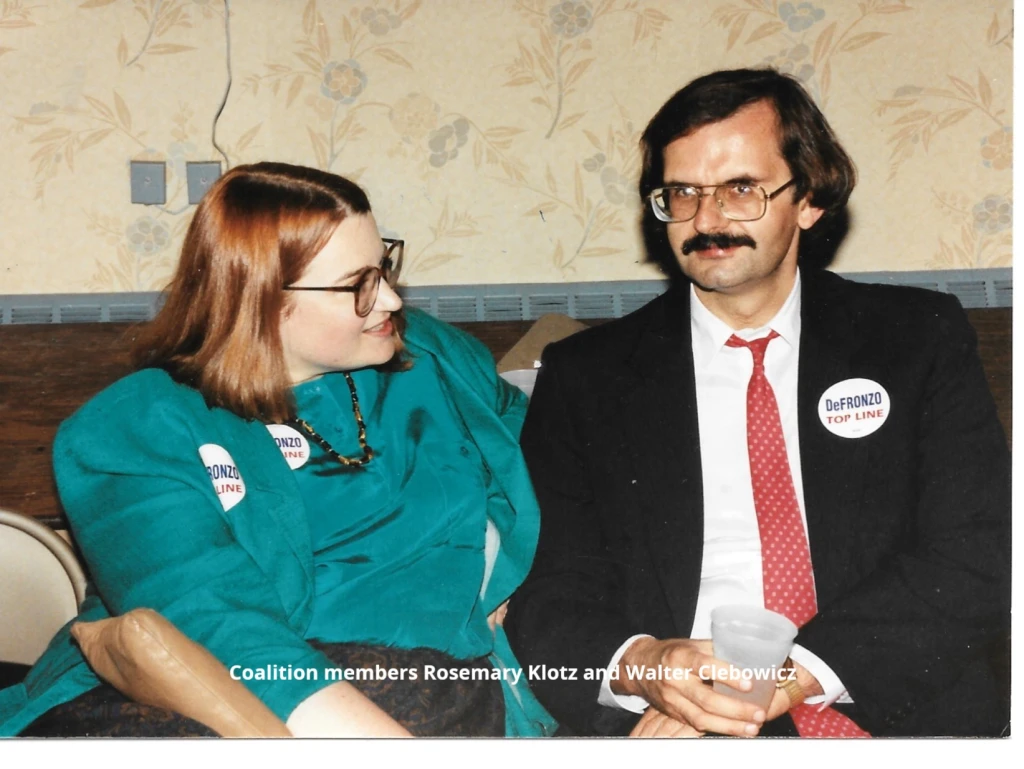
Clebowicz, prompted by a Republican friend, Howard Belkin, who had low regard for Kraczkowsky, encouraged me to spend a few days in that more heavily Republican part of town. Belkin felt I could make some inroads there. I was very reluctant to do so because the demographics there didn’t match my campaign messaging. However, under pressure from Clebowicz and Klotz, I agreed to give it a try.
Throughout my canvassing efforts I was never accompanied by another candidate. I always felt more comfortable on my own, and I believed it was far more efficient to go it alone. On this Saturday morning, though, as I was moving into potentially hostile political territory, for moral support, Nancy Tinker, a candidate for the Board of Education, was going to join me.
I was impressed – the homes were well maintained, neatly manicured and better spaced than were the homes in other middle- and lower-income parts of the city. Our game plan was to hit all Democratic and independent households, and a sampling of Republican families. Nancy and I were greeted with friendly and supportive responses at the first several stops and with neutral but cordial, greetings as we progressed to Republican households.
Nancy was encouraged, but I still felt out of my element, trying to reach into a demographic not particularly well suited to my campaign style. We pressed on. It was a cool September morning, good for walking.
We were now in the upscale Hickory Hill section when we decided to stop at the home of Mrs. Smyth (pronounced Sm-eye-th), a Republican voter. As she came to the door, I gave my typical greeting: “Good morning Mrs. Smith. I am Don DeFronzo, Democratic candidate for mayor. I wanted to stop by …” Before I could finish my sentence, though, she interrupted saying “That is Smyth – long i – not Smith, and I’m a Republican.” I have to say I was taken off guard. Re-focusing, I apologized for my misstep, and told her we knew she was a Republican, but wanted to say hello and drop off a flyer. Hesitantly, Mrs. Smyth (long i) took the brochure and closed the door. That’s the kind of experience I had expected more of, and why I was reluctant to venture into Republican west end territory. In truth though, it wasn’t a bad day overall, and I did return to the area several times over the last five weeks of the fall campaign. Despite my reservations, we did carry that voting district on November 7. Belkin may have been right.
Now with just a little more than a month to go before election day, several debates and joint appearances were being scheduled. We were both invited to speak to the monthly meeting of the New Britain Arts Council, an October 2 meeting of the Chamber of Commerce, and to appear jointly at the 11th Annual Community Congress, sponsored by Citizens Action for New Britain (CANB), the city’s largest citizen action group on October 29. Finally, the League of Women Voters had announced a formal debate program for October 18.
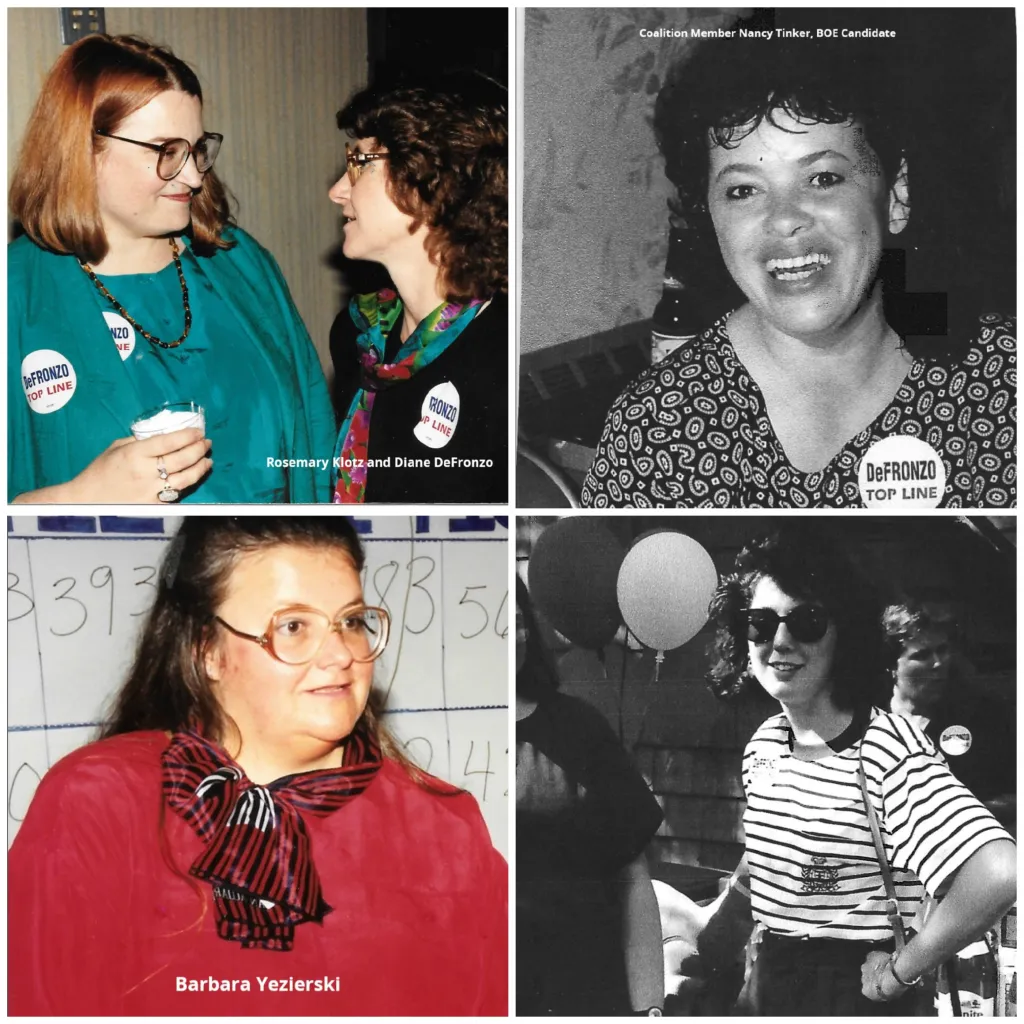
The September fund-raising numbers were reported in the first week of October. Victory in the primary had helped us raise almost $16,000 compared to Kraczkowsky’s $14,234. She did have more money on hand, but clearly the doors had opened wide to traditional political action committees, labor union donations and city contractors. I was no longer concerned about an inadequate supply of money.
The Chamber of Commerce meeting on October 2 was well attended. Kraczkowsky and I presented plans for city development and neighborhood improvement. Marilyn was general in her approach, although she had adopted a number of my neighborhood initiatives in her program. She did not support my proposal to consolidate New Britain development agencies. We discussed a number of issues, but I used the occasion to debut a detailed plan to combat drug crime in the city including the initiation of the COPS program, Community Oriented Policing, which had proved effective in a number of other cities around the country. As I concluded I told the business community that “The message I want to leave with you is a clear one. The top social, law enforcement and health priority of the new administration will be drugs.” Kraczkowsky had no ready reply to that. This meeting was much different than my appearance there two months earlier with Bill McNamara. The cold chill of that late August meeting had changed dramatically. Now I was being taken seriously.
On October 10th Kraczkowsky and I appeared together at the New Britain Arts Council. This was a narrowly focused discussion on the role of the arts the city. It did not amount to much. The discussion was cordial with no significant disagreements. I remember being terribly nervous about that event however, largely because it was the city issue I knew least about. Fortunately, Rosemary Klotz was deeply involved in the arts community and gave me a quick tutorial on the various organizations and their respective interests. I learned a lot in the process, got through the meeting and established some good contacts for the future.
On October 11th State Democratic Party Chairman John Droney offered the full support of the state party to our campaign. It made for some good press, but for a couple of high- profile Democrats attending our last rallies, it really did not produce much.
The League of Women Voters October 18th debate was the big show styled in a formal debate format and moderated by Al Terzi, the ABC Channel 8 news anchor. About two hundred residents were in attendance. Questions covered a wide range of issues ranging from taxes to binding arbitration, to drug crime, to spending and budget policy, personal styles and experience. Due largely to questions from the audience, some of whom were Marilyn’s old adversaries from the Board of Education, she was on the defensive more often than not.
She often read her answers from prepared cards, I adlibbed my responses, allowing for more eye contact with the audience. As usual, I was more structured and detailed, although she was more specific than in her past efforts. One benefit of the long primary season was that I had been exposed to every conceivable question in preparation for the fall election. I didn’t sense there were any knockout blows and I was generally satisfied that my proposals were more on target and well received. The press played it right down the middle, reporting on the differences in our positions, not on who may have “won” the debate.
During this period, the sides exchanged charges. Who was more experienced? Who could be a more effective leader? Who could manage a budget? Who could best work with the legislative delegation? Kraczkowsky’s frequent default position, when attacked, was to decline comment. To this point, though, the campaign was adhering to Bezruick’s pledge that they would steer clear of the CO issue.
As we moved into the third week of October our phone canvassing, which had gone on continually since the primary, continued to show good results. Our primary target voters were holding firm, previous Mac voters were trending our way and we were doing better than 50-50 with the independent voters we had added to our call list. If this pattern held, we would be celebrating on the night of November 7.
In that same week we received the Police Union’s endorsement, another small, but meaningful step forward. We had a fund raiser scheduled for October 26 and a wrap up, get out the vote rally on Sunday, November 5. We could see the finish line. What would Kraczkowsky have in store during the last two weeks of the race?
On October 25th I received the endorsement of the New Britain Teachers Union and addressed the Lions Club, fielding questions which, by now, had become routine. No surprises, no turmoil. Kraczkowsky was to address the Lions in the following week.
We did well with the October 26 fund raiser attended by several hundred, enthusiastic voters. We made some money and had a brief reprieve from the demands of the campaign. Money was not going to be an issue at this point.
On October 29th Kraczkowsky and I addressed CANB’s Community Congress attended by 225 community representatives from all of New Britain’s diverse neighborhoods. I had worked with the Eastside Action Group in my part of town and had come to know many of the attendees. We responded to questions and, on many issues, had similar views. Two things though, gave me an advantage. I had made neighborhood concerns a signature issue in my campaign from day one and had pledged a new era of constructive relations between City Hall and CANB, if elected. In addition, I had demonstrated my interest in CANB in a concrete way by including Paul Aust, a past CANB president, on my slate as a candidate for City Council. There would be no endorsement, only a discussion of issues. When our panel discussion concluded, I stayed at the Congress and talked to many attendees at length. I felt good about the feedback.
On October 30, the New Britain Herald published the results of an informal poll conducted by their staff on October 24 and 25. It was not a scientific poll, but it did provide an insight into voter sentiment. Of the voters polled 48% said they were undecided, 34% favored DeFronzo and 18% preferred Kraczkowsky. Among Democrats who had decided on a candidate, DeFronzo led by a margin 81% to 19%, while Republicans supported Kraczkowsky 75% to 25%. DeFronzo also led among independent voters 68% to 32%. Overall, DeFronzo led among men, and led among women by a large margin. These numbers tracked well with our phone bank results except that the number of “undecideds” were significantly fewer, at closer to 40%.
Kraczkowsky disputed the results but had none of her own to offer. I simply said the Herald poll was generally consistent with what we were finding. The large number of “undecideds” was a matter of concern, but not uncommon. Still, we had no indication that voter sentiment in this critical group would be any different than in the rest of the electorate.
Endorsements now came from two large industrial unions, the United Auto Workers (UAW) and the International Association of Machinists (IAM), both of which had large active and retiree memberships in the New Britain area.
On Thursday, November 2, the New Britain Herald issued its endorsement.
“A city must have influence, governmental savvy and aggressive marketing strategies, Donald DeFronzo, Democratic candidate for mayor, can help provide all of these….Mr. DeFronzo, to New Britain’s advantage, is skilled in administration. He knows the ins and outs of governmental administration”
Unlike its noncommittal pre-primary editorial in September, this editorial was clear and decisive. With their words, voters were encouraged to vote for Don DeFronzo on Tuesday, November 7.
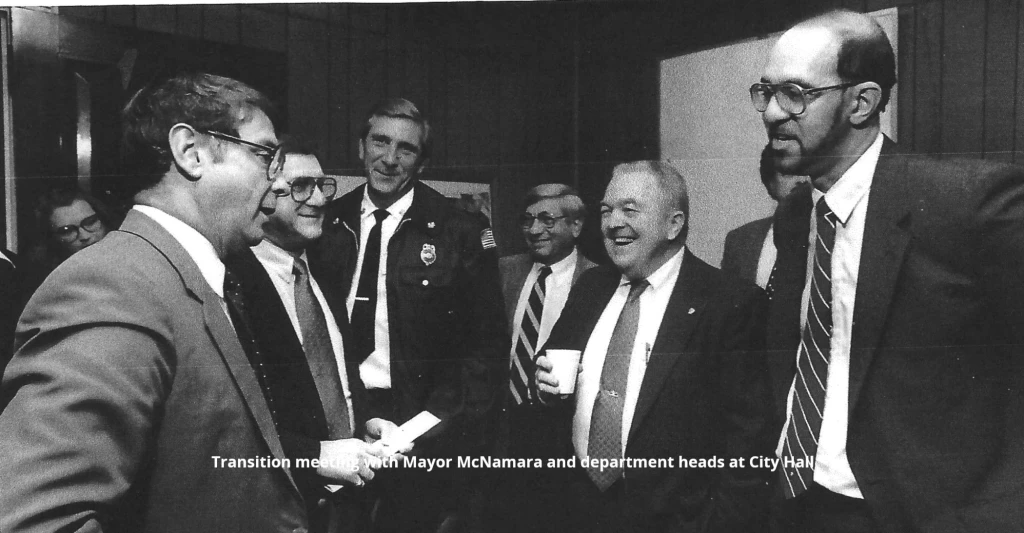
The October fund-raising results were released on November 1 and reported on in the November 2 newspapers. We had done exceptionally well having raised $22,000 bringing our total for the campaign to approximately $80,000, a remarkable total for any New Britain candidate, especially for a “political unknown” who enjoyed a mere 32% name recognition only eight months ago. For the same period, Kraczkowsky had raised $2,500 leaving her far behind and with very little cash on hand.
On Sunday, November 5th, the Hartford Courant endorsed my candidacy for mayor and urged voters to cast their ballots for me on Tuesday, November 7. The Courant said:
…Marilyn Kraczkowsky is engaging and brings an articulateness to New Britain politics that is too often lacking. She is feisty and confrontational. But New Britain needs something more in the mayor’s office. It needs a chief executive of substance and Donald DeFronzo offers that.”
It was a strong endorsement, also dismissing Kraczkowsky’s assertion that gender should play a role in the voter’s decision. The Courant also noted my deep commitment to New Britain’s neighborhoods as another reason to vote for me.
We now entered the final 72 hours of the campaign with a strong wind at our back. Diane began to worry about over confidence and continued, up to the last minutes of the campaign, to insist on a maximum effort from me and all our volunteers.
Sal Bonola, one of our key campaign organizers, told me ride requests for election day were again off the board and we needed to ask the unions for additional drivers. We also saw enthusiasm in the absentee balloting which was running well ahead of 1987 levels. All these signs were seen as positive indications. With only a few days left in the campaign, my canvassing total had surpassed 8,200. Responses continued to be good, the CO issue had virtually disappeared from conversation and people, now thinking they might be talking to the next mayor, asked more questions. While I kept up the door-to-door campaign, it had become significantly less efficient. In the weeks leading up to the primary, I was able to cover 50-60 doors in two to two and half hours, but after winning the primary, and in the lead up to November, that number dropped off to 40 to 45 doors. Many voters now thought they were talking to the next mayor. Canvassing was still a very important part of the campaign, but less efficient than before.
On Sunday, November 5 we held our final spaghetti dinner and rally at the Generale Ameglio Hall on Beaver Street. Likely the largest turnout of the now ten-month long campaign, over 400 voters attended. Candidates served the food in long lines; seniors turned out in large numbers, and we took the names and phone numbers of those who would need a ride to vote on Tuesday. This was all about getting out the vote. State officials rallied the crowd and Joe Harper, glorying in his expanded political influence, spoke of the need for everyone in the hall to vote and to get their friends and families out as well. I made remarks and focused on the end of a very long campaign, the successes we had and the need to finish our job on Tuesday by voting. That was followed by a long raffle, a feature that had become a standard practice at our events.
On the following Monday we finalized preparations for Tuesday’s election. Over 150 volunteers were assigned to phone calling, rides, poll standing, food preparation and delivery and trouble shooting. Clebowicz would watch for problems at the polls, Harper would oversee the headquarters operation, Klotz would coordinate the phone bank and Leavenworth would handle any election press inquiries. As in the primary, I would be moving from polling place to polling place greeting voters. Alex Aponte, an attorney and one of several advisers in the Hispanic community, would drive and accompany me as I traveled around the city. Alex was the first person I knew to use a mobile phone and he used it that day to keep us in touch with Harper and others.
Monday night we had one final rally at the Polish Falcons Club on Broad Street in one last effort to stir voter turnout. Featuring our Polish candidates, an appeal to the approximately 300 voters in attendance was made. Joe Pac, a Broad Street character who had sought office as an independent previously, co-hosted the rally and lent his support to my candidacy. The approximately $400 raised in the raffle proceeds that night was lost and never found – probably lifted from the check-in desk during the program. Other than that, it was another successful night in what had been a very successful campaign. We were now ready for election day.
On Tuesday, Diane and I were up at 4:30 AM, got our kids to my mother’s house early and were off to vote by 6 AM. From there we went to our headquarters, greeted volunteers and settled in for a long day. At my mother’s house, she was joined by two of my aunts and several volunteers who were preparing 400 lunch bags for poll standers and other volunteers. It was an impressive production line precise to the pieces of ham allowed on the ham sandwiches.
From the start of the day, to the end of the day, it all went pretty well. The only complaints came from a few people who didn’t appreciate multiple phone reminders to get to the polls. Turnout looked strong. Strongholds on the east side of town were turning out and the traditionally Polish Democratic districts also were voting in good numbers. Importantly, we saw no surprises from the Kraczkowsky campaign. Wherever I went to greet voters, responses ranged from courteous, to visibly supportive with the latter being far more prevalent.
Bonola reported ride requests were strong and consistent. We ran low on drivers early in the day but managed the demand by moving a few phone callers over to driving. Mayor McNamara was serving as an election day commentator on a local radio station. He had predicted a big turnout and a 3,000 vote DeFronzo victory. He was a guy who knew New Britain politics well. We hoped he was right.
Diane was at headquarters making calls, my brother Jim and sister Maggie, were poll standing. Diane felt things looked good. My son Dave, 12 years old, helped with the delivery of lunch bags to our poll standers, as he had done in the primary. I stopped by my mother’s house in the early afternoon. Though the noon rush was over, they were still cranking out sandwiches. She and the volunteers there wished me good luck. Mom said win or lose you will still be my son but go win.
This time I did not receive a clandestine call about the absentee ballots, but I did not think much about that, assuming the Registrar was busy managing the election day operations. With evening approaching Leavenworth set me up for a few brief radio interviews, each providing me with just enough time to remind voters about getting out to vote before the polls closed at 8 P.M.
By 6 P.M. we knew the turnout was approaching 60% . Joe Harper was predicting a big victory and just about all our key campaign staff were optimistic. At about 7:30 Alex dropped me off at home to meet Diane, so we could change and clean up a bit, before heading over to the Pulaski Club, our headquarters, by the 8 P.M. poll closing time. Again, Diane and I decided to take our seats in the midst of the large Pulaski Club crowd, and along with them, take election results as they came in from the various polling locations.
As mixed as the early vote results were in the September 12 primary, the early returns on November 7 left little doubt of the eventual outcome. District by district results showed us outpolling Kraczkowsky by solid margins most everywhere. There were a few relatively close districts, two ethnically Polish wards in particular, but when we carried the traditionally Republican west end Vance School Voting district there was no way Kraczkowsky could catch us. As in the primary, southend, east side and center city districts were heavily in our favor, piling up pluralities that she could not match.
When it was all over, we had carried all 18 polling places, as well as the absentee balloting. Despite Kraczkowsky’s name appearing on two lines, Republican and Independent, we rolled up a 10,527 to 7,468, or a 3,059 vote margin. I was especially gratified to see that 61% of voters, a very large turnout for New Britain, had voted. Mac was right on the money, 3000 votes. Maybe he had found a new career. I don’t think Kraczkowsky ever called to concede, but the numbers did the talking. For all the concern about the independent line, it had added a mere 623 votes to her vote total. The 61% to 39% landslide helped us bring in every candidate on our slate – a clean sweep. All of us, except Lucian Pawlak who would take office in January 1990, would be sworn in the following week.
The crowd at the Pulaski Club was large and jubilant. My remarks were brief, thanking our Coalition leaders, volunteers and family members. I congratulated my opponent for a strong race and reminded the crowd that we had one week to prepare before taking office. I was especially pleased that my mother’s sister, Aunt Ang from Texas had come up for the election, along with my father’s brother, and his wife Lenny from Delaware. Having them there made me think about the deep roots our families had in New Britain. I wished my father could have been alive to see all of this. In any event, the celebration was on. It was a special day.
With the inauguration just seven days away, our top campaign staff scheduled a Wednesday afternoon meeting to discuss the inauguration and transition issues at my mother’s house on Slater Road. Early Wednesday morning Diane and I, Karen and David took a long ride to clear our heads and discuss the new life we had ahead of us. While we would do our best to lead normal lives, we would all be in public view and the demands on my time, and to some extent Diane’s time would be great. We stopped at a Dairy Queen on Route 66 and had lunch before heading back for the afternoon meeting. We had not spent that much time together in weeks.
Barbara Yezierski, Rosemary Klotz, Diane and I met to make arrangements for the inauguration on Tuesday, November 14. Among the many tasks ahead we had to designate and secure a location. We had several options , but settled for the auditorium at Slade Middle School, which had a large parking lot and a 450-seat capacity. I called the superintendent and got the approval we needed. We also decided to have a post inaugural reception at the Stanley Golf Course. Barbara would take care of that.
We needed to design and print an invitation and assemble an invitation list to include city officials, former mayors, volunteers, community leaders and family. It needed to be completed, printed, and mailed in no more than two days. Rosemary got some additional volunteers to help with that task and with some help from McNamara’s office, we put together the lists. I asked Rosemary to be certain that all the former mayors were invited and that I wanted to personally mail the invitations to McNamara and Manafort. I half expected they wouldn’t show and then embarrass us by saying they weren’t invited. I did, in fact, mail those two invitations.
Next, we had to develop a program. We wanted the popular New Britain High School Jazz Band to entertain prior to the ceremony. We asked Town Clerk-elect Lucian Pawlak to emcee the program. I asked Father Gaffney from my parish to do the invocation and Rabbi Okalika to do the convocation. Rosemary contacted a young African American woman who had sung at one of our earlier events to sing the National Anthem. The program was starting to take shape.
Candidates would be sworn in by groups to their respective offices – Tax Collector, Treasurer, Board of Education, City Council members, Board of Tax Review, Constables and finally the mayor.
In a great irony incumbent Town Clerk Richard Murphy would be required to conduct the swearing in ceremonies for all offices, including mayor. I looked forward to staring him in the eye as I took the oath and assumed the office of Mayor.
All the arrangements were made and I set about writing an inaugural address.
One other awkward situation had to be navigated. Because of the late election date, November 7, Veteran’s Day would fall during the one-week transition period on Saturday the 11th . McNamara, as the incumbent mayor, would conduct the ceremony. I, as the mayor-elect, would certainly be expected to be in attendance. Diane didn’t seem to be too concerned about it, believing that having been elected, the chances of overtly embarrassing actions would be very slight. I wasn’t so sure and was not worried so much about McNamara as I was about some rogue individual doing something foolish. We thought about it for a while and felt better about attending when I realized our entire slate would be there for the ceremonies as well. I attended the main ceremony in Central Park where Mayor McNamara introduced me as Mayor-Elect Donald DeFronzo. The response from the 100 to 150 veterans assembled there was cordial applause, quite appropriate for the event. When the ceremony concluded, I stayed and spoke to as many veterans who cared to talk to me, more than I expected. Now we were ready for Tuesday.
The Inauguration
In the days following the election, I had received many letters from ordinary citizens. As I crafted my speech, I used those letters for content. Inauguration Day was bright and clear, well organized and attended by an overflow crowd including a class of eighth graders from Sacred Heart School who lingered after to ask questions. I worked hard on my remarks and have always considered it one of the best speeches I have ever written.
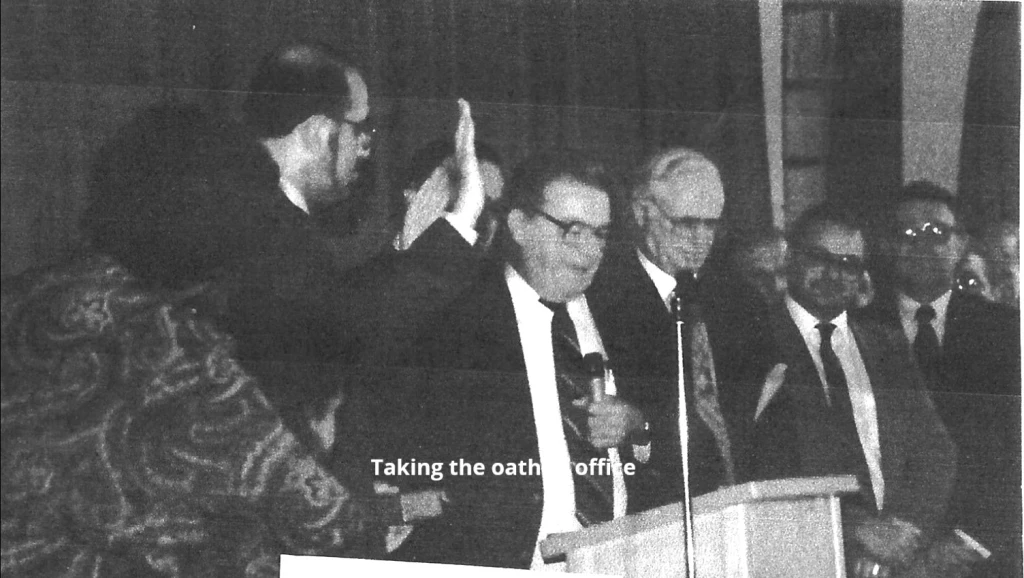
Only one former mayor attended. McNamara, Carey and Manafort did not make it. When asked why he did not attend, Mac said he was not invited. I assured the press that I had personally mailed his invitation to ensure it would get to him on time and left it there. As for Murphy, he administered the oath of office as Diane held our family Bible. As I completed the oath and responded to audience applause, he quietly walked off the stage and left the hall – a class act to the end.
When introduced by Lucian I delivered the following speech.
Inaugural Remarks, November 14, 1989
Ladies and gentlemen – the long municipal campaign of 1989 is over. The voters of New Britain have expressed an overwhelming desire for change-and now, as the campaign subsides, as the parties and congratulatory wishes fade, the challenges lie just ahead.
Today New Britain, as so many other communities, is besieged by problems. We have an aging population; our people are victimized by crime and drug traffickers; our tax base has not grown swiftly enough to support the demand for expanded and costly city services. We are, in many ways, a city in peril.
Despite these challenges, New Britain is a city that has great resources and talents, a community with a resilient spirit, pride and determination.
John F. Kennedy often said that, when written in Chinese the word “crisis” is composed of two characters (or letters) – one representing danger and the other representing opportunity.
Despite the challenges facing our city, New Britain is on the brink of great opportunity, a city of the future poised to enter a new decade.
We must seize that opportunity, we must be prepared to act, to question, to explore and to seek new solutions to old and ongoing problems. United in this common cause we can transform peril into opportunity.
The opportunity we have lies in securing a new vision for New Britain, a vision of a city with a rising skyline, and office complexes, which will fuel new and competitive service industries, a New Britain rich with employment opportunity and the resources to rehabilitate our older, once prosperous, neighborhoods; a New Britain which will once again attract young families, provide quality educational opportunity and a stable tax base capable of supporting the aging, fixed income residents of the city. This vision is ours to achieve.
As we enter a new administration, there is new hope; there is an air of excitement; a new commitment and heightened emotional fervor. This week I received letters from a class of fourth and fifth graders at Smith Elementary School. I think they demonstrate the spirit of excitement and optimism alive today in New Britain.
One letter says: “Dear Mr. DeFronzo, my mother voted for you. She was so happy you won that she shouted in the house at 7 A.M. “ Another says: “Congratulations, I’m very glad you won the election race. I wish you could be mayor forever.” Another says: “I hope you can make New Britain a clean place to live in. I hope you stop people that hurt others.”
Still another said: “I hope you will stop drug deals and put up movie theaters and help the homeless – and give more food to the needy.”
Optimism, enthusiasm and hope – all inspiring qualities, but even these young students know that the problems we face are complex and no one man or woman has all the answers. Only by working together, by tapping all the many resources and talents of our city, can progress truly be made.
As I come to the office of mayor, I bring my own values and standards. I was born and raised in New Britain; I was taught traditional religious and social values. I am part of a generation inspired to public service by John Kennedy; raised in a generation that questioned authority – a generation guided by moral principles and committed to social and economic justice; prepared to work hard, ready to take unpopular positions and committed to fair and compassionate government.
To those who appeal to the worst in people, to those who attempt to divide our community, to those who trade on fear and bias, to those who would exploit race and poverty for political advantage, I say, in me, you will find a constant adversary – one who will expose such tactics and who will fight to focus debate on the real issues.
So, I ask you today, as we launch a new administration, – stand by me and these elected officials – work with us – criticize us when you must, but criticize constructively – challenge us always, but challenge us for the good of New Britain and not for narrow selfish interests; question us, advise us and help us move New Britain forward.
We are partners in government. Just as you challenge me, I will challenge you. This is our city; it can only be as good as we make it. Together we can endure adversity; together we are stronger; together we are smarter and together we can make a difference.
Thank you.
With the conclusion of that speech my term in office began. The long mayoral campaign of 1989 was finally over.
Victory Explained
In the aftermath of the election veteran New Britain political observers tried to make some sense out of what had happened in New Britain in 1989. How did a virtual unknown, anti- war, liberal Democrat, with a CO designation, who had never held a political office unseat a six-term mayor and overcome the united effort of the Republican and Independent parties to become mayor?
Earlier in these pages I shared my personal perspective after the primary. These additional thoughts were generated from Coalition members Joe Harper, Walter Clebowicz, Lucian Pawlak, former McNamara executive aide, Paul Vayer, John King, former New Britain Democratic Party Chairman Bill Weber, an attorney and McNamara ally and others.
There is no disagreement that the formation of the Coalition, its credible and powerful leadership, and our ability to maintain and even increase its influence during the campaign was a primary reason for success. A fragmented candidate field in 1989 would likely have given Billy Mac his seventh term.
These same observers agreed that another primary reason for success was the candidate selected to run for mayor. He, or she needed to be articulate, credible, controlled and willing to do the hard work necessary to win. That principally meant door to door campaigning. The ability to handle McNamara’s attacks on the CO issue, and related ideological issues, demonstrated maturity, leadership and, in some ways, made DeFronzo McNamara’s equal in the eyes of New Britain voters. McNamara loyalists admitted that they neither believed the extent of, nor the effectiveness of, the door-to-door campaigning until late in the campaign. They chose to believe that the numbers were being exaggerated for the press.
Another factor, under appreciated by the McNamara camp, was the public’s desire for change. McNamara’s self-imposed isolation from neighborhood groups and his critics, created a “group think” mentality and a false sense of invincibility. The arrogance and inaccessibility that some of Mac’s supporters simply dismissed as “Mac being Mac”, were actually significant issues in his growing unpopularity.
In addition to the candidate’s ability to manage the CO issue effectively, the ability of the campaign to accurately and effectively address other meaningful community issues was important. While Mac and his inner circle sought an early knockout blow using the veterans strategy ( a strategy that, from reports, was not universally embraced by Mac’s inner circle), voters seemed more interested in talking about crime, taxes and education. Based on poll results, credible policy proposals on these issues, and others, improved the challenger’s standing with voters.
Finally, when the campaign was over, Joe Harper and Walter Clebowicz, two veteran political operatives, observed that over the course of our long ten-month campaign, we had not made one significant mistake. From Joe’s perspective strategically, organizationally, financially, down to the quality of our candidates, the campaign was, essentially, error free. That’s probably exactly what we needed to do in order to defeat six term incumbent, William McNamara.
As a closing observation, throughout my several careers in public service, union work, non- profit management and elected office the only time my CO status was raised as a serious impediment to service was as a candidate for mayor of New Britain. In 2011 when Governor Malloy was considering me for an appointment to his cabinet, I advised him of my CO history, expecting that it might be raised in the confirmation hearings and could become an embarrassment to him. He did not hesitate in responding – “Don, that just adds to my confidence in making this appointment.” The issue was never raised in the confirmation process. Over the years impressions have changed dramatically.
Vietnam was the greatest tragedy of my lifetime. It took the lives of 60,000 Americans and forever changed the lives of millions of others. The war sharply divided the American people for decades and constitutes one of the most ill-conceived foreign policy adventures in American history. For me, confronting the prospect of two years in a federal prison at the age of 21, made every other serious decision I would have to make in my life seem less consequential. They would be important and have impact, but none could compare with the possibility of being separated from my wife and my family and losing my freedom.
Epilogue
For many, the 1989 New Britain mayoral race had a major impact for several reasons. It had a profound effect on local politics. Prior to 1989, the New Britain Democratic Party had been a center-right party, dominated by a conservative Mayor, William McNamara. After 1989 the Party moved to a center-left party, with a more progressive Democratic Town Committee and progressive leadership in the person of Town Chairman John McNamara. On a state-wide basis, New Britain became a more reliably progressive influence on the party endorsement process. All this happened in the space of four years.
The year 1989 also represented a generational change in New Britain politics. I was the first mayor born after World War II and the composition of the City Council became significantly younger with the addition of candidates like Beloin, Rosa, Platosz and Geragosian. The doors were also opened to Hispanic and other minorities, many of whom went on to form the core of a new generation of political activists in New Britain.
Many well-established political leaders affiliated with Mayor McNamara saw their careers effectively terminated with his overwhelming loss in the 1989 primary. Among these were Bill McNamara, Dick Murphy, Anthony Cervoni, Henry Olszewski and Connie Collins, David Malinowski and Stanley Nadolny.
In addition, we brought another kind of leadership to New Britain. Our administration was generally viewed as being exceptionally competent, professional, ethical, transparent, open, inclusive and quite effective in dealing with the social and financial challenges facing the city.

